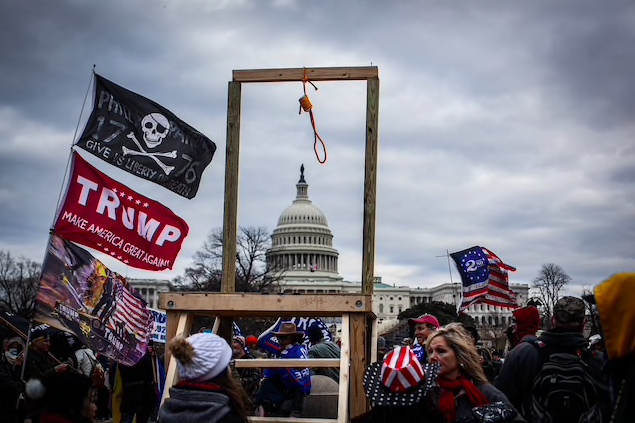Photo credit: Shay Horse/Nurphoto/Getty Images
Last week, Congress voted to acquit former president Donald Trump of inciting the capitol insurrection, under the impeachment articles brought against him. Given that impeachment is the process of removing a president from office, and that Trump had already completed his term by the time the impeachment trial began in the Senate, the utility of the trial was a point of debate. For some it might have been a largely symbolic move, while others had their sights set on tangible goals such as a formal conviction and/or prohibiting him from holding office in the future. Given the Senate’s acquittal, those in the second camp have had to think creatively to move forward in pursuit of those goals.
One such approach has been a case filed last week in which Representative Bennie Thompson (D-Miss.), the chairman of the House Homeland Security Committee, is seeking damages from both Donald Trump and Rudy Guiliani for their role in inciting the capitol insurrection. The complaint also names members of the Oath Keepers and the Proud Boys, two far-right extremist groups, as defendants.
The basis of the complaint is the 1871 Ku Klux Klan Act, part of the Enforcement Acts of the 1870’s. Passed in the Reconstruction era (the time when the country was rebuilding after the Civil War), the Act was intended to put a stop to the KKK’s ongoing campaign of intimidation and terror against politicians and voters attempting to build a national democracy which would include Black Americans. Congress’ authority to pass the law came from the 13th, 14th, and 15th Amendments, which each contain an enforcement clause allowing Congress to pass legislation in furtherance of the amendments’ goals. Collectively referred to as the Reconstruction Amendments, these were passed in the wake of the Civil War in attempt to root out the vestiges of slavery.
In short, this provision of the 1871 Ku Klux Klan Act allows civil action against anyone who uses “force, intimidation, or threat” to prevent public officials from upholding the duties of their office. Although the Act originally provided for criminal penalties as well, the Supreme Court in 1883 struck those provisions down as unconstitutional. The civil components still stand, though they have been only rarely relied on in the last 100 years. It is these components which provide the basis for the ongoing lawsuit, where Rep. Thompson, represented by lawyers from the NAACP and Cohen & Milstein, are asking for compensatory and punitive damages from Trump and Guiliani.
Because this Act has not been used in modern times for such a circumstance, the likelihood of Thompson’s success is unclear. One barrier the legal team seems to anticipate in its complaint is that the Supreme Court has held there is complete immunity for actions by a president/former president undertaken in their presidential capacity. “Presidential capacity,” moreover, has been interpreted broadly. The complaint makes the argument that the speeches made at the Save America rally prior to the insurrection, and all of the Tweets and public comments leading up to the rally, were actions “beyond the outer perimeter of [] official duties.”
The success of this suit would surely satisfy those in the camp of consequences-for-symbolic-purpose. And the symbolic nature is especially salient under this claim in particular. The Ku Klux Klan Act was driven in part by widespread efforts to disrupt a valid election. South Carolina’s governor at the time wrote to then-president Ulysses S. Grant that he felt, as evidenced by the vigilantism against voters and politicians, “they will not submit to any election which does not place them in power . . . . I am convinced that an outbreak will occur here on . . . the day appointed by law for the counting of ballots.” The parallels to this narrative and Democrats’ version of the motivations behind the Save America rally and subsequent insurrection are stark. Perhaps more importantly, the source of the violent rebellion in the 1860’s and 70’s was white supremacy – another poignant comparison to the present day. Indeed, the mere fact of a finding of guilt under a law titled the Ku Klux Klan Act would speak volumes.
Civil liability, however forceful its symbolism in this case, will not prevent Donald Trump from running for or becoming president in the future, as those in the second camp may be hoping for. A number of other possibilities are being discussed on that front, though. One that stands out comes from law professors Bruce Ackerman and Gerard Magliocca, who advise that Congress should rely on Section 3 of the 14th Amendment to bar Trump from office. This section prevents people from holding federal office if they are deemed to have “engaged in insurrection or rebellion” against the Constitution. Ackerman and Magliocca argue that, so long as a majority of both houses agree that Trump engaged in such an act, he would be barred from office. To undo this finding, it would require a two-thirds majority of each house.
Relying on the 14th Amendment would not necessarily lose the symbolic value front and center in Thompson’s lawsuit. The amendment, after all, was similarly passed as part of Reconstruction in order to counter the violent interference of Black Americans’ civil rights by white supremacists. Either route will raise relatively untested questions in the federal courts, and the nation will no doubt be watching.

